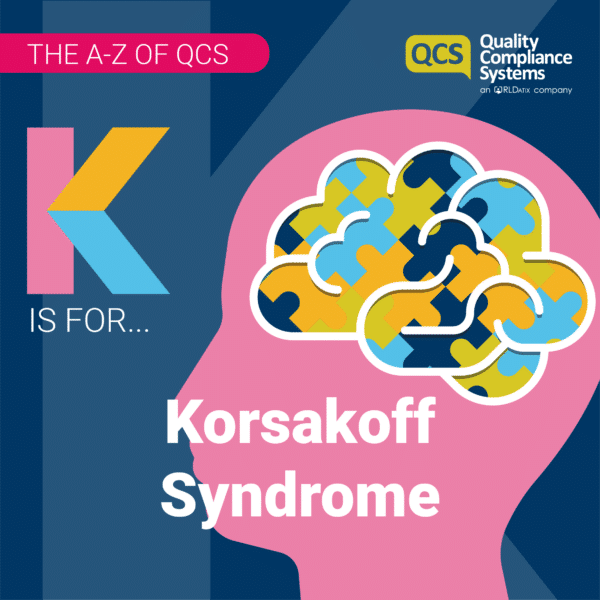Korsakoff syndrome is a chronic memory disorder. We explain what it is and how you can support a person living with the syndrome.
What is Korsakoff syndrome?
Korsakoff syndrome (or ‘Korsakoff’s’) is a chronic memory disorder caused by severe deficiency of thiamine (vitamin B1).
The most common cause is chronic alcohol misuse, and the main symptom is profound memory loss, particularly of events occurring after the onset of the condition. Other symptoms include confusion, trouble processing information and difficulty learning new skills.
Korsakoff’s can result in changes in personality and poor awareness (the person may firmly believe that their memory is functioning normally). Another feature is confabulation, where the person invents fantastical stories to fill gaps in their memory.
Living with Korsakoff syndrome
The behaviour of people living with Korsakoff’s is often unpredictable. They may be restless and highly talkative, apathetic and withdrawn, or may engage in repetitive speech and behaviours. Difficulty empathising can lead to insensitive, dismissive, or even harmful behaviours towards others, as they struggle to understand and respond to the emotions and needs of those around them. Mood can change very rapidly; they may be irrational and quick to anger.
For the person living with Korsakoff’s, quality of life is adversely affected: confusion and cognitive impairment often lead to anxiety, poor decision-making, difficulty maintaining friendships and social isolation. The need to depend on caregivers potentially affects dignity, autonomy and self confidence, and this is why an informed and sensitive approach to care and support is vital.
Supporting a person living with Korsakoff’s
The care and support needs of someone with Korsakoff’s are different from other forms of dementia, since a deterioration in condition is not inevitable, once good supports are in place. If the person stops drinking alcohol, is prescribed Thiamine, and takes a healthy diet, progression can be halted. Initial detoxification and ongoing abstinence support will be needed, along with dietary advice and regular clinical review. Many people will also need long-term treatment for liver damage or other effects of alcohol misuse.
If the person continues to drink and diet remains poor, progression of symptoms is likely to continue.
Caring for someone with Korsakoff’s syndrome can be challenging, requiring patience, understanding, and a clear support plan.
Ten top tips for providing care and support
1 – Familiarisation
Learn as much as you can about Korsakoff’s syndrome. Understanding the condition will help you provide better care and support.
2 – Routine
Evidence shows that people living with Korsakoff’s can benefit from a consistent daily routine. Having mealtime, activity and sleep schedules in place provides structure and can help reduce confusion.
3 – Encourage Healthy Eating
A balanced diet that is rich in thiamine and other essential nutrients is important. Thiamine-rich foods include nuts, seeds, whole grains, lean meats and legumes (e.g. beans, lentils, peas, peanuts).
4 – Limit Alcohol Consumption
Since Korsakoff’s is typically caused by ongoing alcohol misuse, further alcohol consumption should be actively discouraged. Find out what local supports are available to help the person abstain.
5 – Promote Wellbeing
Engage the person in regular physical and mental activities to promote overall wellbeing. Research findings suggest that exposure to natural light may have beneficial effects in reducing symptoms and increasing wellbeing. Outdoor activities such as walking or gardening, along with puzzles and board games can all help maintain cognitive function, while providing opportunity for enjoyment.
6 – Promote Safety
The person may struggle with memory lapses and disorientation, which increases their risk of accidents. Risk assess the environment for potential hazards, remove or reduce them where possible, and consider safety features such as handrails.
7 – Use Memory Prompts
Calendars, to-do lists, and reminder notes can help the person remember tasks, events, appointments, and medications. Digital devices such as smartphones with reminder notifications enabled can provide useful backup.
8 – Facilitate Clinical Review
Encourage the person to attend regular check-ups and follow-up appointments with healthcare professionals. Doctors, psychologists, nutritionists and occupational therapists can all provide specialised supports tailored to the individual’s needs.
9 – Be Patient
Empathy and understanding are important when communicating with someone with Korsakoff’s. Avoid correcting memory errors, as this could seem like unwarranted criticism, and may lead to frustration, distress or angry outbursts. Instead, offer calm reassurance and support.
10 – Self-Care
Caring for someone with Korsakoff’s syndrome can be emotionally and physically demanding. Make sure to prioritise your own well-being: maintain clear professional boundaries, take regular breaks and use supervision sessions to debrief and receive support. It’s also important to practice self care at home: prioritise a healthy diet, rest and sleep, and enjoy social activities with friends and family.






